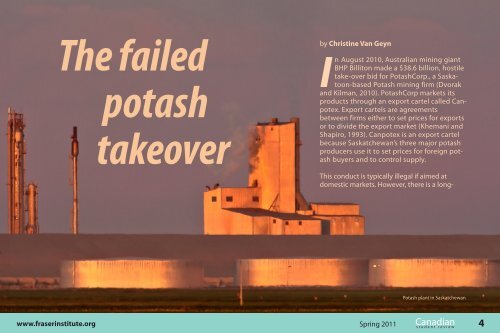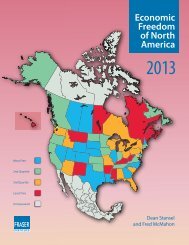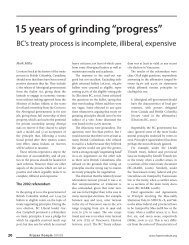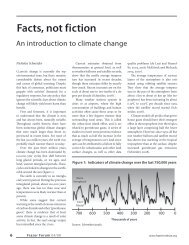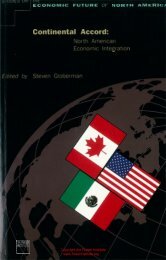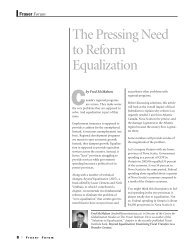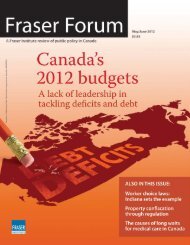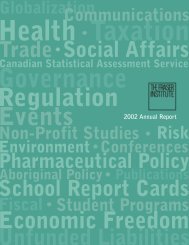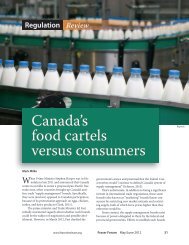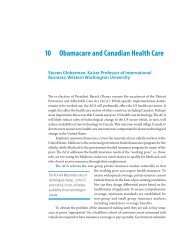The failed Potash takeover - Fraser Institute
The failed Potash takeover - Fraser Institute
The failed Potash takeover - Fraser Institute
Create successful ePaper yourself
Turn your PDF publications into a flip-book with our unique Google optimized e-Paper software.
www.fraserinstitute.org<br />
<strong>The</strong> <strong>failed</strong><br />
potash<br />
<strong>takeover</strong><br />
by Christine Van Geyn<br />
In August 2010, Australian mining giant<br />
BHP Billiton made a $38.6 billion, hostile<br />
take-over bid for <strong>Potash</strong>Corp., a Saskatoon-based<br />
<strong>Potash</strong> mining firm (Dvorak<br />
and Kilman, 2010). <strong>Potash</strong>Corp markets its<br />
products through an export cartel called Canpotex.<br />
Export cartels are agreements<br />
between firms either to set prices for exports<br />
or to divide the export market (Khemani and<br />
Shapiro, 1993). Canpotex is an export cartel<br />
because Saskatchewan’s three major potash<br />
producers use it to set prices for foreign potash<br />
buyers and to control supply.<br />
This conduct is typically illegal if aimed at<br />
domestic markets. However, there is a long-<br />
Spring 2011<br />
<strong>Potash</strong> plant in Saskatchewan<br />
Canadian<br />
s t u d e n t r e v i e w<br />
4
standing international practice of exempting<br />
export cartels from domestic competition law<br />
(Sokol, 2008). Canada has an explicit exemption<br />
for export cartels in section 45(5) of the Competition<br />
Act (1985). When BHP made its initial<br />
hostile take-over bid, its CEO Marius Kloppers<br />
stated that the new firm would market outside<br />
of the cartel, which would effectively break it<br />
up. Both the Saskatchewan provincial government<br />
and the Government of Canada were<br />
concerned about the end of the tax revenues<br />
they received from the artificially high world<br />
prices of potash made possible by the cartel<br />
(Rocha and Jordan, 2010). <strong>The</strong> deal finally <strong>failed</strong><br />
because, on November 4 th , 2010, Minister of Industry<br />
Tony Clement used his power under the<br />
Investment Canada Act to block the <strong>takeover</strong>.<br />
Explanations for export cartel exemptions<br />
<strong>The</strong> transaction, and the Government of Canada’s<br />
response to protect the potash export cartel,<br />
raises the issue of the treatment of export<br />
cartels in both Canada and internationally. Although<br />
their proponents claim that export cartels<br />
exemptions enhance efficiency, this justification<br />
is insufficient. According to this incorrect<br />
theory, by centralizing common sales activities,<br />
cartels allow members to avoid costly duplication<br />
of services. In a competitive market, these<br />
lower costs are passed on to buyers in the form<br />
of lower prices. If this efficiency explanation is<br />
correct, cartel operation should be associated<br />
with both an increase in the rate of export and<br />
www.fraserinstitute.org<br />
a fall in the price of those exports (Dick, 1990).<br />
However, this does not occur in practice. <strong>The</strong><br />
political process interferes, and efficiency ends<br />
up being determined by the political process,<br />
rather than by economics.<br />
This was the experience with Canpotex. During<br />
the potash price squeeze in 2007; Canpotex<br />
restricted supply and pushed through higher and<br />
higher prices on its contracts (Waldie, 2010). This<br />
behaviour can be explained partly by strategic<br />
trade theory, which suggests that a government<br />
creates export cartel immunity in order to improve<br />
its terms of trade (Sokol, 2008). According to<br />
this theory, cartels are associated with a reduced<br />
export volume and a higher export price, which is<br />
exactly the result we see with Canpotex. Government<br />
policies exempting export cartels shift rent<br />
from a foreign firm to a domestic one. Collectively,<br />
competitive firms will export more than a monopolist<br />
would, leading to less favourable external<br />
terms of trade, and a lower industry rate of return<br />
(Dick, 1990).<br />
Export cartels are also justified as a way for exporting<br />
firms to overcome market barriers in the<br />
importing state. Exporting companies tend to<br />
lack knowledge of the market they are targeting,<br />
which causes competitive disadvantages<br />
relative to the competitors within the importing<br />
state (Becker, 2007). However, Canpotex was not<br />
formed to facilitate market entry. It was formed in<br />
the 1970s in order to restrict the supply of potash<br />
and stabilize the price because new Saskatch-<br />
<strong>The</strong> political process interferes...<br />
Spring 2011<br />
Canadian<br />
s t u d e n t r e v i e w<br />
<strong>Potash</strong> ore<br />
...and efficiency is no longer<br />
determined by economics<br />
5
ewan mines were flooding the market. Moreover,<br />
Canpotex controls a substantial part of the world’s<br />
supply of potash and supplies mostly into markets<br />
that have no domestic production (Waldie, 2010).<br />
Public choice theory suggests yet another explanation<br />
for the existence of export cartel exemptions:<br />
the consumers harmed by export cartels are<br />
foreign. Foreign consumers are a large and diffuse<br />
group, and therefore less effective than the participants<br />
of export cartels at mobilizing politically<br />
to protect their interests (Sokol, 2010).<br />
Harm caused by export cartels<br />
One of the most obvious objections to export<br />
cartel exemptions is that they allow the firms<br />
in exporter states to pursue monopolies and<br />
cartel profits at the expense of the importing<br />
Cartels beget other cartels<br />
www.fraserinstitute.org<br />
state (Becker, 2007).This is described by Fox as a<br />
“beggar-thy-neighbour” approach to international<br />
trade. <strong>The</strong> events surrounding <strong>Potash</strong>Corp<br />
“exposes a very soft underbelly of anti-trust—exemptions<br />
and non-coverage. Nations like Canada,<br />
which publically deplore cartels, allow them when<br />
they hurt only foreigners” (Cartelization, 2010:<br />
340).<br />
Export cartel exemptions can also harm trade<br />
by leading to retaliatory measures between<br />
states. It is sometimes the case that firms in target<br />
states organize market power in response<br />
to the conduct of an export cartel (Immensa,<br />
1995). Professor Rahl describes this as the<br />
tendency of “cartels [to] beget other cartels”<br />
(1989:9). This harms total, overall welfare. On<br />
a global basis, the anticompetitive effects of<br />
export cartels can be no better than a zero-sum<br />
game, as one country’s exports’ gains from monopoly<br />
rents are another country’s consumers’<br />
losses (ABA, 1991).<br />
<strong>The</strong>re is also the possibility of purely domestic<br />
harm resulting from export cartels. Unless<br />
there is no consumption whatsoever of the<br />
exported goods in question in the home mar-<br />
ket, export cartels are likely to influence the<br />
amount of production as well as prices on the<br />
home markets (ABA, 1991). Even if firms are<br />
able to resist the temptation to collude domestically,<br />
the fact that sensitive pricing information<br />
is shared in order to set foreign prices<br />
may lead to “conscious parallelism” (Immenga,<br />
1995:125). While Canada exports 95% of the<br />
potash produced, it still consumes 5% within<br />
Canada (Stone, 2009).<br />
Eliminating export cartels<br />
<strong>The</strong> Organisation for Economic Co-operation and<br />
Development (OECD) has called for “the worldwide<br />
repeal of cartel exemption coupled with an<br />
efficiency defense” (OECD, 1993). Likewise, the<br />
American Bar Association proposed repealing<br />
export cartel exemptions, but only after subject<br />
to a “rule of reason” analysis (ABA, 1991:85). This is<br />
Spring 2011<br />
Canadian<br />
s t u d e n t r e v i e w<br />
6
It is hypocritical to<br />
block the foreign<br />
<strong>takeover</strong> of<br />
<strong>Potash</strong>Corp<br />
Red potash fertilizer<br />
a sensible solution. <strong>The</strong> instances in which cartels<br />
facilitate the entry of exporters into new markets,<br />
and help exporters to overcome market distortions<br />
in foreign markets would need assessment.<br />
Canada has also become a prominent proponent<br />
for the end of export cartel exemptions. In recent<br />
deliberations in the OECD and the World Trade<br />
Organization (WTO), the Canadian government<br />
has endorsed the view that existing immunities<br />
for export cartels in various countries’ laws (including<br />
Canada’s) should be repealed or substantially<br />
abridged (Trebilcock, 2010). It is therefore<br />
quite hypocritical that the Government of Canada<br />
blocked the foreign <strong>takeover</strong> of <strong>Potash</strong>Corp in<br />
order to protect a domestic export cartel.<br />
How can a prohibition on<br />
export cartels be achieved?<br />
<strong>The</strong> effects doctrine: a unilateral solution<br />
<strong>The</strong> unilateral application of antitrust law by<br />
the importing state against export cartels<br />
hosted by foreign states could be a partial<br />
solution to the problem. <strong>The</strong> United States has<br />
successfully used the “effects” to prosecute<br />
international cartels that harm US consumers<br />
(Hauser and Schone, 1994). This doctrine<br />
allows one country to enforce its competition<br />
laws against conduct that occurs primarily or<br />
exclusively in the territory of another country,<br />
when it is intended to have some injurious<br />
effect in the territory of the enforcing country,<br />
and has that very effect (US v Aluminum Co. of<br />
America, 1945).<br />
Most parts of the world have accepted some<br />
form of the effects doctrine (Fox, 2002).<br />
Both Canadian and European competition<br />
authorities have taken tentative steps towards<br />
the assertion of extraterritorial jurisdiction<br />
of their own. <strong>The</strong> limit of the effects doctrine<br />
is the ability of foreign countries to access<br />
the information needed to prosecute cartels<br />
that have anticompetitive effects within<br />
their borders. This is particularly problematic<br />
in countries like Canada, which have no<br />
requirement that export cartels report their<br />
activity. A possible solution could be that states<br />
could reform their laws to require notification<br />
of export cartel activity, and transparency.<br />
Under this proposed regime, immunity<br />
would be given to export associations that<br />
will not be anticompetitive. It would then be<br />
up to the antitrust agency of the importing<br />
country to take steps against any potential<br />
anticompetitive behaviour by export cartels<br />
(Sokol, 2010).<br />
<strong>The</strong> Irish Competition Authority (ICA) has<br />
used this kind of approach. When seeking<br />
to determine what foreign firms might be<br />
engaging in anticompetitive conduct in<br />
Ireland, the ICA made use of the filings of US<br />
export cartel associations. This is unilateral<br />
www.fraserinstitute.org<br />
Spring 2011 Canadian<br />
s t u d e n t r e v i e w<br />
37
enforcement, but made possible at a low cost<br />
through transparency (Sokol, 2010).<br />
International solutions<br />
One of the most promising avenues for an<br />
international solution to export cartels is the<br />
WTO. A formal effort to address competition<br />
issues within the WTO began when members<br />
agreed to launch the Working Group on the<br />
Interaction Between Trade and Competition<br />
Policy (WGTCP) at the WTO Ministerial<br />
Conference in Singapore in 1996 (Hafbauer and<br />
Kim, 2008).<br />
<strong>The</strong> European Union, Canada, and Korea<br />
are advocates of a WTO Competition<br />
Policy Committee, which would monitor<br />
<strong>Potash</strong>Corp Tower in Saskatoon<br />
www.fraserinstitute.org<br />
all notifications and transactions between<br />
separate member states (Clarke and Evenett,<br />
2003).<br />
According to World Trade Orgazination reports:<br />
Canada takes the view that a WTO Competition<br />
Policy Committee should be established.<br />
Such a committee could play a significant<br />
role in enhancing exchanges between Members<br />
and serve as a forum for Members to<br />
learn about each other’s practices and policies.<br />
This type of dialogue would be distinct<br />
from the case-specific cooperation, such as<br />
exchange of notifications or coordination of<br />
investigations that occurs under bilateral arrangements<br />
(World Trade Organization, 2003).<br />
However, despite these statements of support,<br />
WTO members <strong>failed</strong> to reach a consensus<br />
on the content of possible international<br />
competition rules. After the September 2003<br />
Cancun Ministerial Conference ended in<br />
deadlock, the General Council of the WTO<br />
dropped competition policy from the Doha<br />
agenda in 2004 (Hufbauer and Kim, 2008).<br />
Since the WGTCP has <strong>failed</strong> to achieve a<br />
consensus on new international competition<br />
rules in the WTO, it is worth considering<br />
how the existing WTO framework could be<br />
used to prohibit export cartels. <strong>The</strong> most<br />
promising WTO provision is Article 11.3 of the<br />
Agreement on Safeguards, produced in the<br />
Uruguay round, which states that “members<br />
shall not encourage or support the adoption<br />
or maintenance by…private enterprises.” A<br />
footnote to the agreement then reads that, “of<br />
similar measures include export moderation,<br />
export-price…monitoring systems, export…<br />
surveillance” (Becker, 2007:124). This approach<br />
has not yet been used against export cartels,<br />
but has some potential.<br />
<strong>The</strong>re are, however, some problems with<br />
using the WTO. For example, the current WTO<br />
remedies are not suitable for competition law<br />
objectives because they are limited to trade<br />
retaliation. This measure runs counter to the<br />
objective of competition law: competitive<br />
markets (Canadian Comp. Bureau Draft<br />
Paper, 1999).<br />
Conclusion<br />
Export cartels like Canpotex reduce global<br />
welfare and harm foreign consumers.<br />
Canpotex is particularly damaging, because<br />
potash is used as a fertilizer by the developing<br />
world. <strong>The</strong> Canadian cartel, combined with<br />
the cartel activity in other potash-producing<br />
countries like Belarus and Russia, contribute to<br />
the artificially high global price of fertilizer and<br />
the food crisis.<br />
Governments do not deny the harmful effects<br />
of domestic cartels, yet export cartels continue<br />
to operate under exemptions. Through<br />
Spring 2011<br />
Canadian<br />
s t u d e n t r e v i e w<br />
8
unilateral application of the effects doctrine,<br />
and through increased transparency, states<br />
can take some steps to protect themselves.<br />
However, what is really required to end export<br />
cartels is coordinated action, and coordination<br />
will require political will. Until there is more<br />
political will for a coordinated effort to end<br />
export cartels, situations like the blocked<br />
<strong>takeover</strong> of <strong>Potash</strong>Corp by BHP will continue to<br />
reduce global welfare.<br />
References<br />
American Bar Association (1991, September 1). Special<br />
Committee on International Antitrust Report: 84.<br />
Becker, F (2007). <strong>The</strong> Case of Export Cartel Exemptions:<br />
Between Competition and Protectionism. Journal of<br />
Competition Law & Economics 97:116.<br />
Cartelization: Professor’s Critique of Hostile Bid Triggers<br />
Discussion of Export Cartels. 99 Antitrust and Trade<br />
Regulation Report (BNA), No. 2467: 340 (2010).<br />
Clarke, J., and S. Evenett (2003). A Multilateral Framework<br />
for Competition Policy? In S. Evenett (ed.), <strong>The</strong> Singapore<br />
Issues and the World Trading System: <strong>The</strong> Road<br />
to Cancun and Beyond.


